RADLEIAN





Our approach to birthdays probably depends on a mixture of personality and the number involved. We might be naturally or by necessity nostalgic, looking back to past glories with sentiment or with a desperate desire to hold on to them as age takes over. We might equally be those who prefer to look forward to the future, perhaps with trepidation as challenges loom ahead or at other times optimistic about new opportunities and possibilities.
As Radley celebrates its 175th anniversary, I think all four approaches have merit. We are proud of our heritage; we enjoy the traditions and, I hope, stay loyal to the original vision of the founders who had Beauty, Collegiality, Privacy and Christianity as four fundamental principles. It is lovely to look back and trace that heritage, as Clare Sargent’s book, Untold Stories – written for the anniversary year to trace these themes through the less wellknown parts of Radley history – does so well.

It is more than sentiment, however. We need to work hard to hold on to certain things as they become less fashionable or, at best, less valued. Time and space to develop individual thought rather than pander to the trends of the day; the value of continuing the tradition of regular Chapel as a place of worship and reflection; stressing beauty in the face of mundane utilitarian and seeing the value of a collegiate community in a world that so often cares only about the individual. We are right to look back.
We must not be set in aspic, though. We need to look forward too, and it is a particular theme of the anniversary year that we should do so. A glance at this magazine will, I hope, generate a sense of a school that is trying new things, and, just as significantly, doing old things in new ways. There are challenges ahead – political, social, financial, environmental – and we will meet them headon. More than that, it is vital too that we prepare boys thoroughly to meet them for themselves, both at Radley and beyond.
Properly focused sentiment, therefore. A sense of what needs preserving. A realism about the challenges we face. But there is the fourth approach as well. Simply looking forward with excitement and energy; remembering that education, as well as being weighty and significant, is fun. As we wish each other a collective happy 175th birthday, I hope you find a lot of fun in these pages too.
John Moule WardenA year is a long time. And the length of one robotics season. Over the past 12 months, five pioneering Robotics teams from Radley created robots and enjoyed success in the global Vex Robotics Championship. Alastair Vaan, Head of Computer Science, introduces the newest addition to our co-curricular programme.
Robotics is an all-consuming pursuit. The effort of multiple individuals in various disciplines is required to bring a working robot to life. Each year, a new challenge game is presented, which forms the basis for a season of competition. In ‘Robot Skills’ the teams try to score as many points as possible over six rounds – three of which must be fully autonomous.
The most exciting competition is ‘Teamwork’. Over a competition day, teams are placed in alliances with a second robot team, which may be another school or club. They compete together to overcome another robot alliance. With four robots on the twelve-foot square pitch, strategic planning and reliable engineering are key as, although it’s not Robot Wars, there is plenty of robust contact. Over a series of round robin qualifying matches, with alliances changing each match, the robots attain a ranking depending on their scores and other key measures of their performance. This ranking determines their choice of a final alliance to compete in the elimination finals. Here is where
engineering ends and skills in diplomacy and negotiation come to the fore. Robot teams aim to work with robots that complement theirs, so good robots are in high demand! The remaining matches are played in a knockout format until one alliance is left – both teams winning the trophy.
A day of robotics is relentless – from robot inspection in the morning through to the quick-fire qualifiers. There is rarely much time between matches so technical issues require quick fixes! Throughout the competitions, industry judges roam and gather evidence for awards in build and design, and team attitudes. Finals are played in the afternoon and awards

presented. The trip home often features a quiet minibus...
Having qualified earlier in regional tournaments through the season, Radley eventually took three teams to the national final, which took place over two days in an enormous indoor space at the Telford International Centre. They earned their place by winning regional tournaments or placing highly in the National Robot Skills League. After a frantic inspection and with a few tweaks needed, all our teams applied themselves to the qualifiers. The teams are identified by their registration numbers (so there is no Bigside!), boys form their teams and are attached to one robot for the season. 84899A Allen, run by a dedicated group of 6.1 boys from J Social, finished at the very top of their division. They lost just one match of thirteen played – no robot present performed better. A second team, 84899E qualified in a very impressive fourth. Our final team finished mid table after a tough second day. With qualifications over, Allen chose an alliance with a robot they had worked with before – a good choice, but one that ended in tragedy as their semifinal ended in a technical loss. 84899E lost a close quarter-final.
Allen finished the tournament with a superb and well-earned Amaze Award in their division – this award is judged by industry experts and was appropriate recognition of their dominance on the day – as well as the tournament’s best qualification record. They finished fourth nationally in the Robot Skills competition. 84899E also impressed the judges with their attitude across the two days and walked away with a Sportsmanship award. Overall, a huge achievement by all three teams.
With their first year under the belt, teams are already focussed on the next game which was released in May. It is fair to say the boys have their sights squarely aimed at similar success next year. Skills learned over the year will be amplified as they enter a second year. A few lucky teams each year qualify to a global championship in Dallas. Who knows…
Robotics is a key discipline for the 21st century. For those aiming to pursue STEM careers it forms tangible experience of an idea-to-product lifecycle and the pressures of industrial competitiveness. For others, the experience of a long-term journey with continuous problem-solving and a good share of highs and lows furnishes individuals with both people and technology skills. The richness of the pursuit has drawn me to competitive robotics for a decade – the boys who find themselves similarly drawn in gain an experience they will carry with them, whatever their future holds. It is notable that, of their own accord, the boys put an immense amount of their spare time
into the robots – and all the teams have learned a wealth of new skills.


Robotics at Radley continues to grow. Boys take part through the 6.1 Curriculum Extension Programme, in their own time in the evening society or even beyond, hence the dedicated Makerspace buzzes with independent activity throughout the season. More teams will compete next year, and younger boys will get the opportunity to take part. We are planning to hold our own tournament in the future and there are plans for Robotics within the partnerships programme too, introducing young children to opportunities in STEM education they may not get elsewhere.

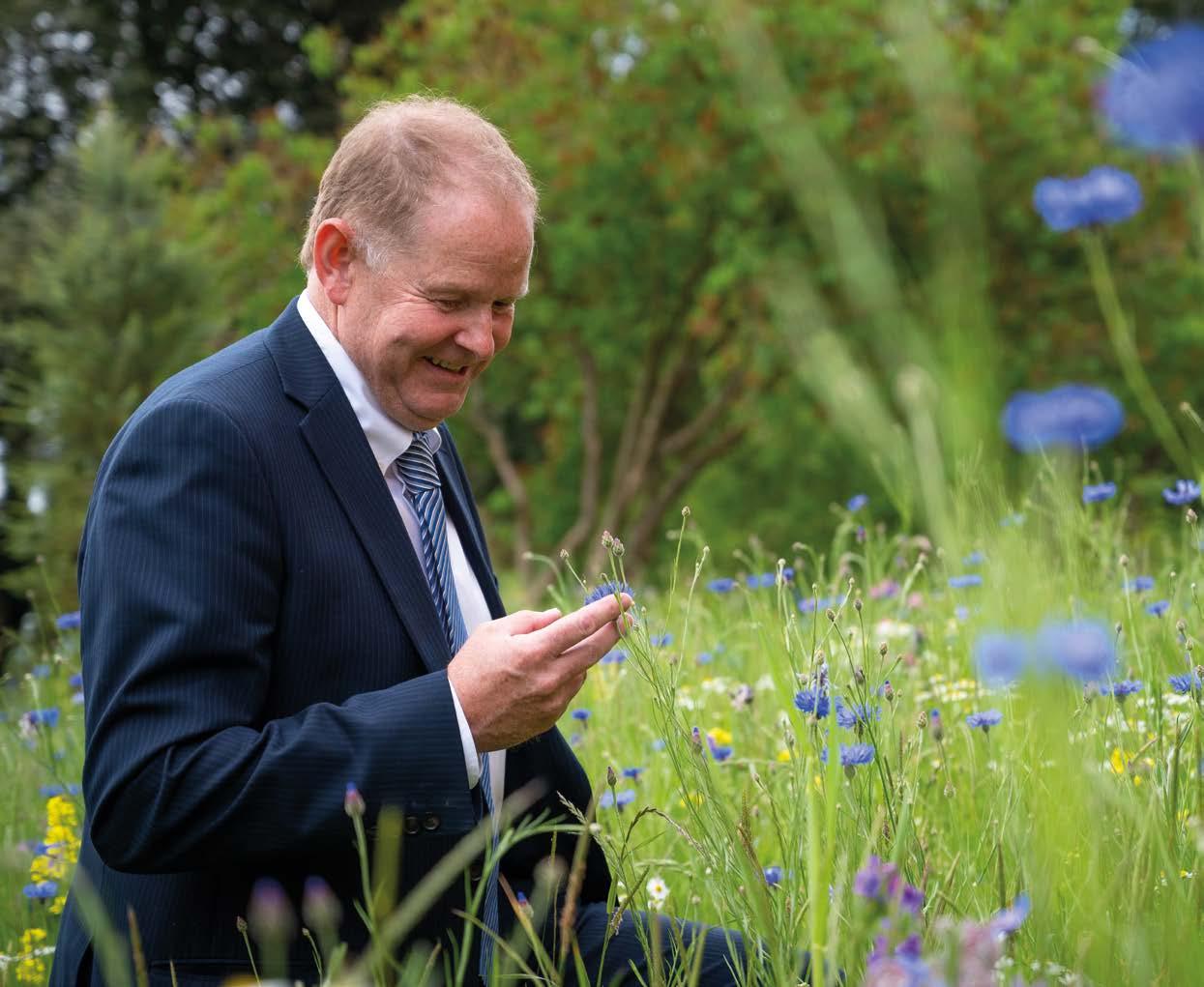
As we reflect on our 175-year history, we are also looking to the future. Sustainability is a major part of our estates strategy and by 2030, Radley College plans to be carbon neutral. David Anderson, Estates Bursar, discusses our achievements to date and outlines our next steps.
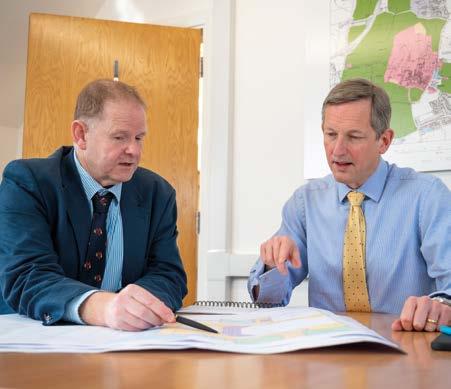

In the College’s founding vision, Sewell said that boys should live and learn in beautiful and natural surroundings. On the surface the campus is little changed, with new architecture blending effortlessly with the old, but in the last 10 years we have significantly upgraded our infrastructure and building fabric.
It might surprise you to learn that 90% of lighting on campus is by LED, the golf course and pitch irrigation system is serviced by borehole and not mains water supply, and all our electricity is supplied by renewable sources. Some projects are less exciting, such as increasing the efficiency of our plant rooms, upgrading and sealing windows, managing our systems more effectively and implementing zero to landfill, but they all contribute to a low energy foundation which will allow us to effect real change.
There are four things we need to look at. Firstly, we simply need to use less energy. This will involve continued insulation of our buildings as well as behavioural changes such as turning off lights and not wasting food. Secondly, we need to use less ‘stuff’. We need to repurpose buildings, rather than
knocking them down and rebuilding as one example.
We need to produce our own energy. Becoming carbon neutral is no easy task, and many organisations rely solely on carbon offsets to achieve their goals. Whilst we recognise that offsets form part of the toolkit to achieve this, we are blessed to have an 800-acre campus which provides ample opportunity to do things differently. Notably, we plan to build a 20-acre solar farm to the northeast of the campus which will produce 4 megawatts of electricity; enough to fulfil all our energy needs on campus and export some back to the grid.
The fourth point indicates how I believe we are unique as an organisation and a school. We plan to sequester carbon by rewilding a large portion of our 530-acre farmland to wildflower and planting 50-acres of trees. This will balance the carbon that we inevitably use in our operation.
This won’t simply be a project that I will do independently, it’s something that boys, staff and parents can become involved in. I won’t see the results in my lifetime, it may take 30 or 40 years to grow. If we consider that our forefathers planted the main drive trees in 1899; they never saw the beautiful campus we have today, but we are now able to enjoy the benefit which is exactly what we want to do to the original parkland. If we all get involved and do our part, this will set up Radley College in a sustainable way for the next 175 years.

From snakebites to games injuries and mental health to made up excuses, the staff at Radley’s Medical Centre see it all. Ahead of his retirement in June, Dr Julian Moore, Radley College Medical Officer, and Alex Gilley, Lead Nurse, reminisced about their combined 30 years at Radley. We listened in…

Julian Moore: Long Furlong Medical Centre, where I’ve been a partner for over 27 years, began its relationship with the College in 2002. By coincidence I had trained at the practice that looked after Radley in the early 90s.

The Medical Centre (then known as the Infirmary) was much the same then but staffed by just two nurses – Kenis Barker and Margaret Hauton – who split the shifts between them. When Kenis retired, I suggested we looked for people with young families, who could work shifts during term time but would be happy to have the holidays to be with their children.
Alex Gilley: Jane Lambert started as Lead Nurse in 2006 and I took over from her in 2012. Jane prepared the
ground for me — her policy-writing was phenomenal, and our medicines management policy is a legacy from Jane’s time.
JM: Although we took on more than we expected in 2002, the partnership between the College and Long Furlong works well. I, or another GP, come up here every week day for Short Break, but usually end up staying longer than 30-minutes!
AMG: The Nursing team do an initial triage to ensure the GP’s time is used wisely and then we make appointments for the boys.
JM: When I look back over the last 20 years, communication is the biggest change. In 2002, all boys’ records were kept on cards, known as ‘Lloyd Georges’ which were kept here. We moved onto PDAs (palmtop computers) which we would sync with the records at the practice, but essentially the records were separate. When everything became computerised it improved communication as it allowed all the records to be combined in one system.
AMG: The change in 2006 from two nurses to a team with complimentary skills was huge. The pitchside support role was created to match the skillset of Annette Hack, who came to us as an emergency nurse practitioner. Annette could assess injuries quickly and order X-rays which cut out a lot of time for PHMs sitting in the Minor Injuries Unit. She later became Lead Nurse at Abingdon School and Mark Chambers, followed by Sarah Turner, have hugely developed the role.
JM: It really helps to have nurses with specialisms so that people understand who to speak to about particular issues.
AMG: We all try to have a link role. For example, Di runs immunisations, Carey runs the asthma and flu clinics, Jenny leads in diabetes, and Emma and I lead in mental health and are involved in PSHE.
JM: Did you have any prior experience with mental health?
AMG: I’d had some as I previously worked in acute medicine, A&E and cardiology at the John Radcliffe Hospital, but mental health has become a real passion. It’s so rewarding to help these pupils and their families through their time here. The great thing about school nursing is having that time and continuity.

JM: I absolutely agree — if we know a boy struggled in their Shell year, we can then support them more effectively when they are further up the school. You mustn’t underestimate the support you and your team give to the College community, Alex.
AMG: We’re fortunate to always be listened to and supported. I never feel that our concerns or questions are dismissed, especially during the COVID pandemic. We had planned to run a scenario of an outbreak, but COVID came before we had chance! The pandemic has been the biggest challenge of my career, but probably the best.
JM: We did worry about how we would carry on if significant numbers of staff members were affected by a contagious disease – how would we care for the boys?
AMG: A lot carried on here though. All the boys were still registered at Long Furlong; prescriptions were still needed and ongoing health issues didn’t stop because of the lockdown. The counsellor and psychiatrist were still running online clinics.
JM: We missed out on two years of meeting the younger boys as we normally would too. Coming out of the other side of the pandemic has meant working to address those gaps, but also returning to things such as pitchside care, which is an area of our work that I’m really proud of.
AMG: Michaelmas term really does keep us on our toes. We see injuries caused in lessons and everyday life just as
frequently as the sports field. I’ve treated more snake bites than my friend in Australia! And then there are the excuses the boys use to try and get out of Steeplechase. I remember a boy coming to tell me his Dad (a doctor) had advised he shouldn’t take part. As I called home to check, the door slammed. The boy had vanished!
JM: But I do think we see the best of the boys here though. We’re not disciplining or asking anything of them, we want it to be somewhere they can come to talk and seek advice if they need it. I’ll miss that.
AMG: We’re going to miss you so much.
JM: I’ve just so enjoyed my time here. The staff are so interesting, and I feel they draw things out of people in a way that only really high-level teachers can. It has been a complete pleasure.
Dr Andrew Cunningham found teaching after a successful career in journalism. He retired in July after many years as a schoolmaster, including 14 at Radley. His association with this magazine is significant and well-known, but rarely have we heard from the legendary don in first person, until now! We wish Doc a very happy retirement.
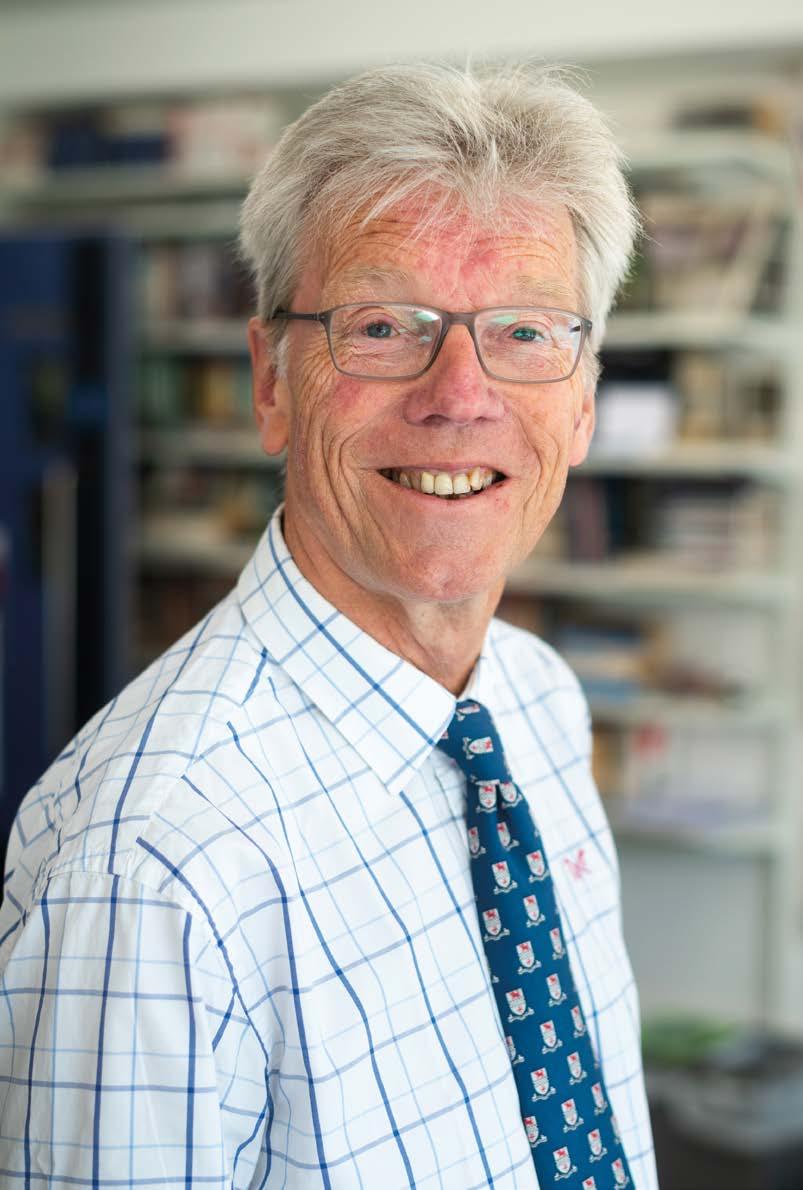
In a previous role as a freelance journalist, I wrote lots of words. Now I spend much of my time reading the words of Radleians. It’s a sobering thought that, as a retiring English teacher, I must have marked thousands of essays and read millions of words: some of them, it has to be said, rather hastily written!
Not that I’m complaining. I’ve loved being an English teacher. Before Radley, I taught at Pangbourne, Uppingham, Cranleigh and Charterhouse, so I know a well-run, well-resourced school when I see one and saved the best to last. I’ll miss the role and Radley enormously. The buzz that comes from being part of a GCSE or A-level lesson that goes well is hard to beat. As is the satisfaction of helping a lower-level Rugby, Football or Cricket team scrape out a hard-fought draw on the far-flung playing fields of Tonbridge, Sherborne or Harrow.
So what’s changed in teaching in all that time? Well, technology for a start. I never came into the job thinking I was going to have to cope with computers, websites and spreadsheets. And when I think of some of the characters I started teaching with three decades ago – their comfy tweeds, fountain pens, flowery handwriting and traditional ‘chalk and talk’ teaching methods – it amuses me no end to wonder how they might have coped with lessons delivered remotely on an iPad to students all over the world.
So, have educational standards improved during that time? One fact remains constant: I started teaching in 1988, the year GCSE, together with its accompanying coursework (‘Cursework’?) was introduced. Education has remained a political football ever since. ‘Education, Education, Education’ ran the mantra and, over the years, there have been many educational fads and initiatives: AS-levels and grade inflation being two prime examples. I remember assuring a studious sixth former back in the Nineties that the C grade she’d just achieved in her English A level was “a perfectly respectable grade”. Now C grades are almost unheard of at selfrespecting independent schools. As for the introduction of A*s, the argument was that they would nip grade inflation in the bud once and for all...
Yet during those decades, there have undoubtedly been significant steps forward, not least in terms of curriculum diversity, differentiation and
the provision of learning support. Inevitably there have been losses too: like perhaps the reassuring foundation of intellectual ‘certainties’ that more traditional teaching methods tended to foster. Sometimes, on a humdrum day in the classroom, I tease some of my younger sets by asking them to try and guess when Chaucer, Shakespeare or Jane Austen were alive (“No, please put that phone down immediately!”). I miss too the intellectual freedom of feeling able to indulge in constructive red herrings in class, without falling foul of over-prescriptive GCSE and A-level syllabuses. The boys can often benefit from some well-targeted digressions.
It’s ironic that two of my best role models as all-round ‘schoolmasters’ were themselves Radley dons. At St Paul’s School in the 70s, the most inspirational teacher was undoubtedly the late Peter Thompson, who went on be Head of Emanuel in Wandsworth and started his career at Radley in the 60s.

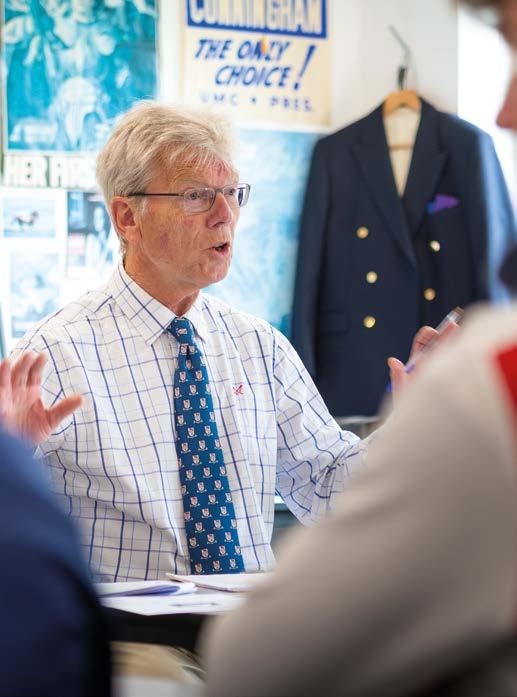
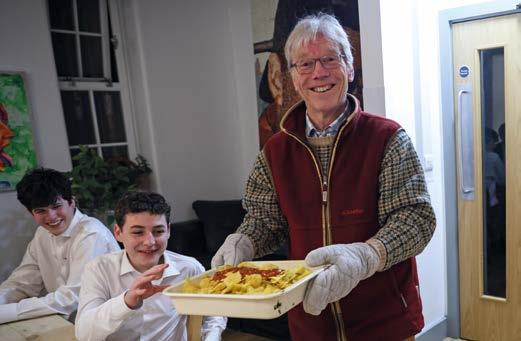
He once caught me chattering about Pink Floyd in an A-level History class. No need for a Fatigue. All he had to do was ask me, stony-faced, whether I was pleased with the average grade I’d just achieved at History O level. Years later, when I became a teacher myself, I was lucky enough to work for the late Anthony Hudson, former Tutor of F Social and Sub-Warden, Pangbourne’s compassionate and inspirational Head at the time.
Now my didactic days are done. All the same, I still like to think I’m a survivor. IT never came easily, but I can still sport the badge of honour of having survived (just about) two Radley terms of remote teaching, during the COVID crisis. And that in a small way illustrates the best part of the job. The old cliché that “you never stop learning” is so true. All those bright, amusing young Radleian minds help keep teachers mentally sharp. I’m certainly going to miss that in retiremen t.
f you were to walk down to Sandford Lock on any afternoon of the week from September to July, you would most likely see boys of all ages, abilities, and physical attributes in boats from Eights to Singles and everything in between. They all have one thing in common: they all take pride in racing in the Radley red and white. From humble beginnings in 1847 to now, Radley is undoubtedly one of the best equipped, best coached, and most successful school boat clubs in Britain. The Radleian speaks to the boys and staff writing the current chapter in the Boat Club’s illustrious history.
Radley College Boat Club has produced Henley, National, World and Olympic

champions, not a bad record. But how does the club continue to consistently churn out talented rowers and scullers?
Since the first Olympic medallist in 1948 to our three most recent – Charlie Elwes, Tom George and Ollie Wynne-Griffith, RCBC has always masterfully balanced elite training with mass participation.
“We want boys to love rowing at all levels, which breeds a sense of purpose and pride in the club. That culture and mentality is infectious and enduring, which has been a vital ingredient in our success” says Sam Townsend, Master in Charge of Rowing, himself an Olympian.
“During their five years here, boys progress through a structured programme that will allow them to
excel at the highest levels of British Junior Rowing or just keep fit. I think we’re unique in that regard, as many schools just focus on the top end. I’m proud that we have so many boys rowing. Yes, it ensures a strong pipeline for the top boats, but it also allows boys to benefit from the transferrable skills that rowing brings.”
But how does this ethos resonate with the boys? Ed (6.2, C Social), Captain of Boats, believes the positive culture of the club contributes to a sense of togetherness that is infectious. “For the first time in a long while, we have a 1st VIII down to a 4th VIII, as well as three U16 boats and three U15. This is a massive achievement which shows how
positively the boys view rowing. Winning the Thames Team Cup at Schools’ Head of the River perfectly highlighted our strength and depth.”
The opening of the indoor rowing tank in 2015 was the icing on the cake of an already impressive set of facilities and a first-class fleet of boats. In addition to a beautiful stretch of river, our boys benefit from the professionally equipped McKenna Strength and Conditioning Studio with three coaches and a 32 station ergo room. The fleet includes 35 single sculls, 12 pairs, 12 fours, 16 eights and 11 coaching launches. The 1st VIII’s Filippi boat is almost identical to those used by Team GB in the Tokyo Olympics. Andy Thomas, Boatman, said: “This is one of the very best school fleets in the country, possibly the world. The boys know it and are proud and humbled by it in equal measure. They know that they have the very best foundations for success; and, more often than not, they deliver strong performances.”
Led by Sam Townsend, European and World medallist, the stellar line-up of coaches calling Radley home is second to none. Chris Bartley won silver in the lightweight four at London 2012 and was world champion in 2010. John Gearing, previously Master in Charge, has coached prize-winning crews across the world, and coached the GB Men’s Pair at Caversham last year. Mike Genchi, who leads the 16.1 boat, has significant levels of experience coaching for Team GB and has created a very quick squad. Three coaches from the Leander Men’s 8 coach the younger years, and a smattering of dons, many of whom rowed successfully at university, coach boats from all year groups.
Some may question why – with an outstanding roster of coaches, world class facilities and driven athletes –major honours at Henley have eluded RCBC for so long. Junior Rowing News, a popular website for school rowing, describes our success at Henley as ‘close but no cigar’. The last win in the Princess Elizabeth Challenge Cup came in 1998, with runners up medals in 2001, 2012 and 2017. In 2018, Radley lost in the semi-final to St Paul’s – widely
regarded as the greatest schoolboy crew of all time. Despite this, Sam Townsend says there is much to be proud of.
“It plays on our mind a bit, but we don’t feel burdened by the pressure. We have a fantastic programme here and have so much to feel good about. It’s no surprise that our boys are consistently successful in Team GB trials, are always challenging for the podium and can give top crews a good race at the major events. I don’t think many schools will be able to boat as many competitive crews across the board as we do. That’s a boat club to be proud of.”
After an impressive start to the regatta season, our 1st VIII felt confident that they could cause an upset at Henley. After overcoming Teddies and Shrewsbury in stylish fashion, Radley had a tough semi-final against Eton on Saturday. As the rain fell, our crew looked confident on the start line, but the strength of Eton’s crew quickly became apparent as they took an early lead. Our boys remained strong to the end pipping Eton to the post by millimetres, spurred on by huge roars from the Steward’s Enclosure.
Commentators described the performance as one of the best in memory. Unfortunately, the boys were unable to overcome an exceptionally
strong St Paul’s crew in the final, but it was a Henley year to be remembered. The Princess Elizabeth Cup will return to Radley very soon, watch this space!
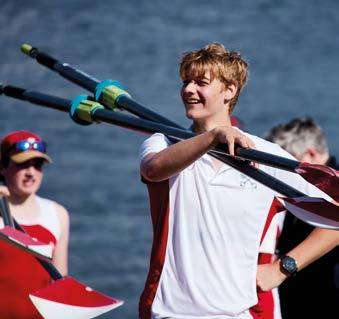
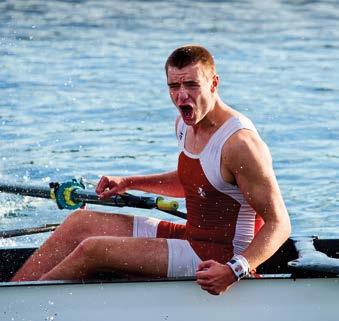
The National Schools’ Regatta at Eton Dorney proved to be a fantastic weekend for Radley College Boat Club. The first medal of the weekend came for the 15.2 who won a bronze medal, with the 15.1 taking silver in their race.

In a golden hour, 16.1, 16.2, 2nd VIII and 3rd VIII all won gold medals, an exceptional achievement for our boys and the club as a whole.
James Gaunt, Director of Sport, commented: “that golden hour reminded me of super Saturday at the London 2012 Olympics! It was very pleasing to see the boys’ hard work and commitment pay off. The success of these boats shows you what can be achieved when you are prepared to take yourself into an uncomfortable place and stay there! The boys in those boats, and their coaches, deserve a lot of credit for their performances. The success of the boats, the noise from the bank and the smiles on the faces of all RCBC supporters suggested that the boat club is in a great place at the moment. My challenge to them is to keep improving!”
The Curriculum Extension Programme runs throughout the 6.1 year and offers boys the chance to broaden their intellectual horizons via a range of options ranging from film studies to robotics. Kevin Mosedale, Head of Curriculum Extension, introduces the scheme and outlines the importance of academic stretch.

As a Radley don, it’s my job to help boys prepare for external examinations, giving them a springboard to higher education and future employment. However, there is more to a Radley education than sending boys off after five years with excellent exam results. The ability to work independently, think critically and solve complex problems is crucial for success in the modern world. The development of these attributes is embedded across our teaching and learning, but the Curriculum Extension Programme provides a structured framework for boys to flex their intellectual muscles. This ensures they are competitive in the university entrance process and, eventually, the job market. It also aims to make them more interesting people with a broad range of interests.
One of our most popular options is the Extended Project Qualification (EPQ) which is equivalent to half an A-level. It involves students choosing a topic, carrying out research, writing a report and delivering a presentation. There are four different types of projects that can be undertaken and although the most popular by far is the dissertation, a few boys each year tackle a scientific investigation, give a performance, or create an artefact, which ensures breadth and variety across the year group. It’s very popular with universities who recognise that completing an EPQ develops the kind of independent study skills needed to thrive in higher education and consequently some institutions make lower offers to students with an A or A* for their EPQ.
The fact that boys choose a subject which really interests them ensures they are incredibly committed to the cause. By the end of the project, they will probably know more about the subject than anyone outside a university environment and the process of researching, writing, and supporting their case with fully referenced sources is a rigorous academic exercise that is not for the faint-hearted.
In the last two years, all projects by boys have been awarded an A or A*, which not only demonstrates the academic prowess of Radleians, but highlights their dedication and application. As we continue to refine our Curriculum Extension Programme, I am confident we will ensure our boys are prepared for the ever-changing needs of the modern world.

Here are a selection of EPQ titles from this year...
To what extent were the actions
British Empire in India justifiable?
To what extent do economic in modern China display
actions of the justifiable?
Why do similarities occur between mythology, folklore and religion in differing nations and empires of the classical world?
Could asteroid mining be important for future growth and development?

The costs and benefits of space exploration – is it worth it?


Was Edward Hopper solely influenced by the impressionist movement? matter?



ideas?

There were plenty of standout statistics to celebrate for RCCC this summer. A record number of boys played in a record number of games. That 255 boys could play competitive cricket is a testament to the hard work of so many people. Simon Dalrymple, Master in Charge of Cricket, reviews the season.



We are incredibly fortunate that coaches throughout the club foster a love of the game and respect for its values and the number of senior boys choosing to play cricket is a reflection of the quality of their work. Special mention must also go to Adam King and his team of ground staff. We have become used to Bigside looking pristine but the quality of playing and practice surfaces across all grounds is incredible and the envy of many visiting coaches.
On the field, almost 60% of the 164 matches completed were won and JC 1 and Bigside both won their respective John Harvey Cup competitions. Midgets 1 improved rapidly as the term progressed and their results in the two games against Eton clearly reflected
this fact. They finished with good wins against a touring Manchester Grammar side and a strong Winchester team. However, Colts 1 were the team of the term. Despite losing 4 players to Bigside, they won all 10 matches (and hence the league title) in quite some style. A thrilling match against Wellington and back-to-back wins against Eton, Harrow and Tonbridge in the second half of term reflected the quality of a side that was well led and contains lots of players who will push for first team honours in coming seasons. The strength of the top teams in each year group bodes well for the future of the club.
In the year that the club bids a fond farewell to Andrew Cunningham, it feels right to finish celebrating all that is good about the participation thread of school sport. We aim to find as much competitive cricket as possible for all of our pupils, but it is the lessons learnt from taking part as much as the winning of these games that is important. Andrew has worked tirelessly in the lower echelons of school cricket and
rugby and epitomises the values of a traditional schoolmaster. Following the 4th XI match against Winchester, his opposite number was moved to write an email thanking Andrew for the quality of his hosting. The note mentioned Andrew’s charm and generosity and, most importantly, he remarked that the Winchester boys (despite being well beaten) “came away from the afternoon smiling, positive and feeling that it was an afternoon well-spent.” Now the dust has settled post Gaudy, Radley Cricket can reflect on a fantastic season and be ready for another tough set of fixtures next summer.
In a normal week, the Music School is home to over 400 instrumental music lessons. However, it’s not just classical music that can be heard coming from the rooms around Silk Hall. Molly Moran, Graduate Musician in Residence, tells us how she is helping our rock bands and DJs to take centre stage.

Inspired by the magnificent standard of music that surrounds us, the popular music enthusiasts of Radley College are making their mark. Every evening, the music department serves as a focal point for diligent practice and ensemble rehearsal. This is accompanied by bands, songwriters and music producers who can often be found jamming away in a far-flung practice room.
Picture the scene. Budding music producers, sound engineers and DJs


make their way to the professionally equipped recording studio. Here, they work on recording and producing their own music, ranging from acoustic pop to earth-quaking electronic dance music. Supported by the expert guidance of DJ & Music Production Teacher, Nico Bentley, this group has thoroughly enjoyed sharing ideas and helping them come to life. Since September, four Shells have formed their own electro-band, covering songs on various synthesisers and some senior boys have also performed DJ sets at various venues around the campus.
Alongside this army of technological excellence, we also have musicians who prefer a more traditional band set-up. The bands are formed by boys from all year groups and they take on cover songs as well as writing originals.
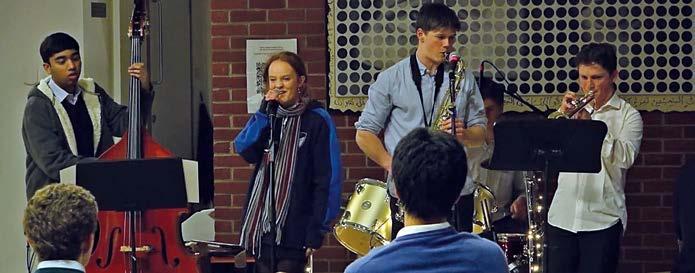
Amongst them you can find rappers, a seven-piece Shell rock band, and jazz lovers. These boys inspired the creation of our own record label, through which pupils have the opportunity to record and digitally release their songs. Winners of the ‘Battle of the Bands’ competition on 26 May will have the prestigious honour of being the debut act for Radley Records. Additionally, this inaugural act will soon be joined by the participants of a song writing project with friends from partner OX14 schools.
With so many exciting projects and performances on the horizon, we cannot wait to see what they do next. Hopefully, they remember us when they are headlining international festivals or climbing the charts…
The Everyone’s Invited movement highlighted some of the pervasive cultures and attitudes that teenagers can be exposed to. The stories shared by young people across the country were horrifying and we wanted to make sure that we weren’t ignoring the problem. In response, we have worked proactively with Downe House, a leading girls’ school with whom we already have close links, to develop The Respect Project. Lydia Robinson, Head of Geography and Girls’ School Partnership Lead, tells us more.
The Respect Project aims to foster genuine and respectful relationships between boys and girls for the benefit of the individuals involved, the schools and wider society. It has two strands:

• Partnership activities between Radley and Downe House, involving academic collaboration, co-curricular activities, and social events
• Relationships and Sex Education (RSE) offered through PSHE and supported by a team of Sixth Form Ambassadors.
The Warden and Emma McKendrick, Headmistress of Downe House, determined that the project should be characterised by openness, honesty, and a commitment to listening and learning from all participants. During this academic year, partnership activities have been taken place across the academic, co-curricular and social spheres including a Shell Global Issues Conference, Poetry Open Mic Night,
Humanities Symposium, Ten Pin Bowling Socials, BBQs at Radley, a joint Hockey fixture and much more, enabling Radleians and girls from Downe House to meet regularly and engage in collaborative projects.
In addition, a team of 16 Sixth Form ambassadors have been trained and now work with groups of younger boys after RSE talks to help them process and reflect on the material covered. To measure the success of our work, we are working with the author and consultant, Chloe Combi to analyse shifts in attitudes over time.
By working in partnership with Downe House, we hope to provide all students with direct and meaningful experience of working with the opposite sex, preparing them fully for life beyond school while retaining the integrity and value of single-sex education. Joint activities mean students have male and female role models, ensuring that different perspectives are valued and that respectful relationships are embedded within school culture.
Harry (6.1, G Social) and Jasmine (6.1, Downe House School) kindly agreed to share their thoughts on the project so far.
L: Why is the project important to you and why do you think it is important for both schools?
H: Issues such as consent are important for people to discuss and understand, so being part of the project means I feel
I am helping to make a difference in educating people. The project also has many different strands, and I enjoy being involved in all aspects of the project; training and educating younger boys, driving the direction of the syllabus, and meeting new people.
J: The Everyone’s Invited movement highlighted consent as a significant problem for our age group and I think it’s especially important in single-sex schools to have difficult conversations about issues such as consent whilst we are still at school.
L: What has changed for you because of your involvement?
H: I’m a Sixth Form ambassador, which gives me the opportunity to run discussion sessions after PSHE sessions with younger boys. This is very powerful because it gives them the opportunity to explore challenging topics and to debate ideas in a safe environment.
J: The introduction of more and more activities has enabled further
communication and collaboration between pupils at both schools. This normalises social contact and gives us all the opportunity to have our voices heard. I was involved in the recent Downe House-Radley Humanities Symposium, and it was amazing to see open communication between pupils at both schools as well as watching the groups producing ideas together.
L: What is the value of interacting with Downe House girls as equals in academic and co-curricular activities?
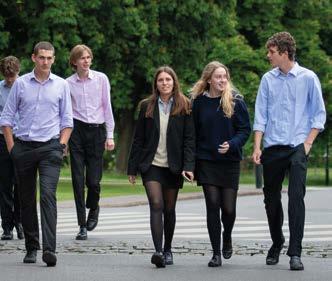
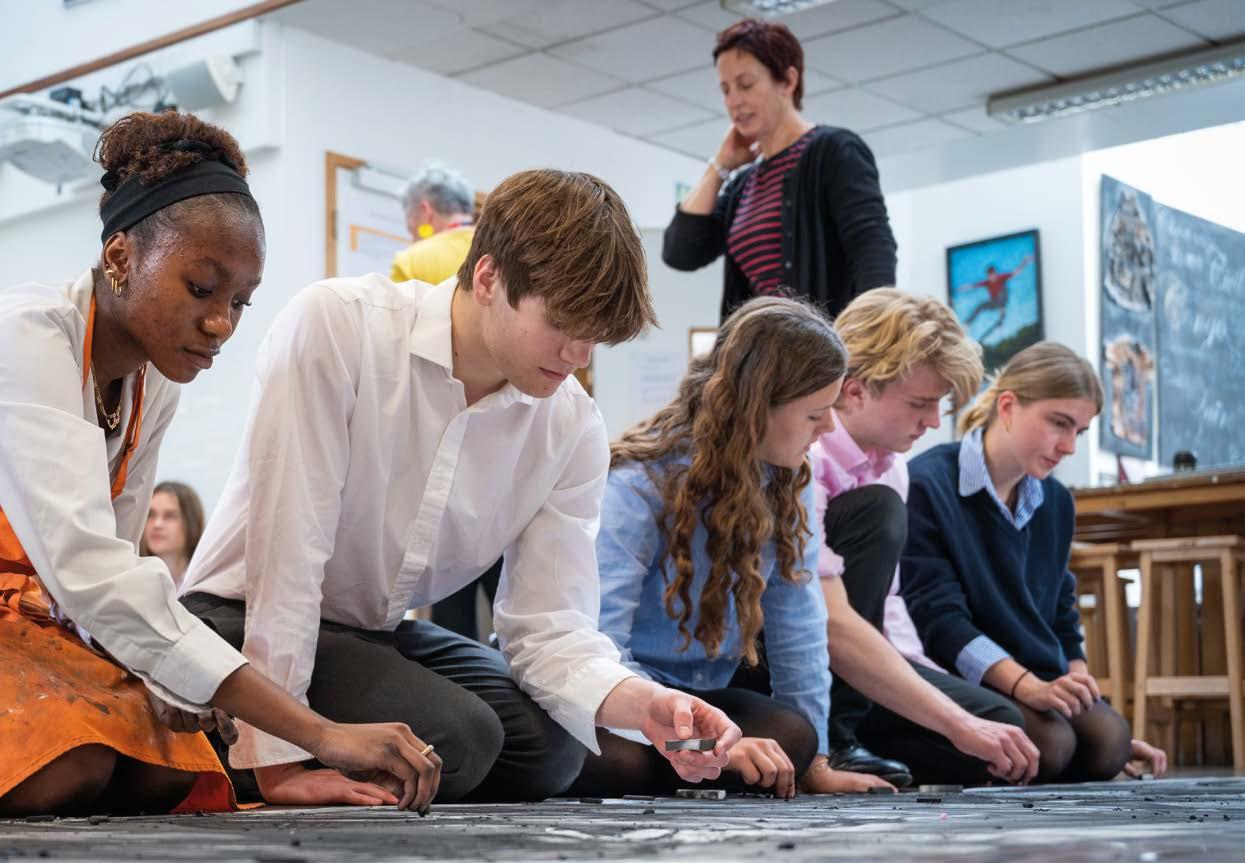
H: We have always had socials with Downe House, but now we are seeing more academic and co-curricular activities, which have been fantastic. We wanted to build friendships, and this is now happening in a more genuine way than was possible via ad-hoc social engagements. It has been really refreshing, and good for us all.
J: The opportunity to interact with boys in academic and co-curricular activities emulates life beyond the school gates and it gives us an induction into
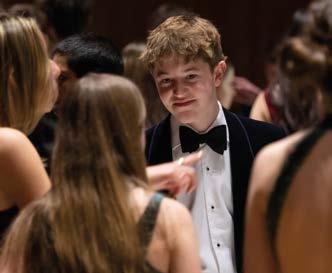
‘normalised’ communication before we leave school. I’ve also enjoyed meeting new people and making friends with the Radley boys.
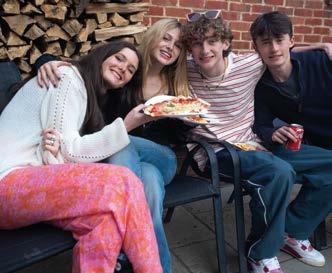
L: What is your hope for the future of the Respect Project?
H: In just one year of the project, so much has been done. One of the most important aspects of the project for me, is the relationship between the older and younger students, meaning younger students have male and female role models. I hope to continue breaking down the boundaries between year groups, making the younger students more proactive in asking about topics they may feel unsure or uncomfortable about.
J: My hope is that this collaboration will be a step to creating a safer and more harmonious environment between young women and young men. We all have a part to play in that.
This year’s Remove play, Dodo, written by Nicolas (6.2, L Social), was a touching and occasionally humorous depiction of the effects of dementia, and one man’s desire to escape the prison of his decaying mind. Kit (6.1, A Social) reviews the performance, which had two casts.
After being diagnosed with Alzheimer’s Disease, Francis, played by Cosmo (R, D Social) and Malachi (R, L Social) abandons his life and family to seek out the adventures he feels he missed out on while he still has time on his side. As he leaves home, he meets Lucas played by Blake (R, A Social) and Charlie (R, G Social), a young man running away from a broken heart and predictable future.


Together, the two travel to Brazil, attempting to leave behind the things that kept them anchored. Cosmo (Francis) and Blake (Lucas) had a fantastic rapport, each seeing in the other their own failures and frustrations. As their journey progresses, we witness Francis’ deterioration and attempts to deny the inevitable nature of his illness.
The cast did a fantastic job of balancing the weight of these topics with humour, and highlighted parallels between our

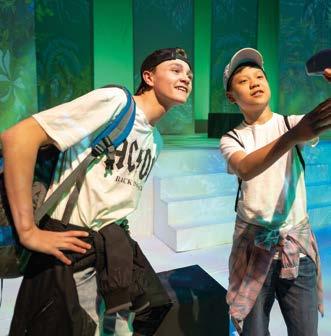
own personal journeys. Every character the two travellers encountered cleverly reflected part of Francis and Lucas’ mindsets; whether it was the Chief of the Amachuba tribe or a zoologist, they too were unsatisfied with what they had and were trying to move away from the root of their frustrations.
Dodo challenges the audience as to the purpose of our existence and whether there is value in mourning the loss of spent time. The bold artwork, designed by Wardrobe Assistant Kathryn Croxson, fantastic set design and lighting help to capture this plurality existing in all of us, allowing past and present to seamlessly interact from the perspective of Francis’ fading mind. Eventually, in realising they must return home and make the most of their time with the people they care about, Lucas and Francis go their separate ways. Francis realises that he cannot run from himself and finally accepts the reality of his own existence.
Special recognition must go to Miss Buse for her direction and Nicolas for writing a heartfelt and nuanced script during his A-level year. Together they produced a fantastic play which intelligently balanced the harsh reality of living with Dementia and the humour and value of our existence as individuals.






Few plays carry such an entertaining and thought-provoking experience as A Few Good Men by Aaron Sorkin, particularly messages which are increasingly relevant in a modern context. The January 2022 performance was no exception to this, and carried a heavy message on justice, gender, and morality, while proving an exciting 90 minutes of entertainment. Dillon (6.1, E Social) reports from a packed Theatre.
The play takes place in the Summer of 1986, throughout parts of Washington D.C. and Guantanamo Bay, Cuba, and explores the court-martial of two US marines, Private Loudon Downey and Lance Cpl. Howard Dawson, following their use of a ‘code red’ against fellow Private William Santiago – which results in his demise. Notoriously lazy and seeking to settle in court for a plea bargain, Lt. Daniel Kaffee is tasked with representing the two Marines, accompanied by the more experienced Lieutenant Commander Joanne Galloway who wants to defend the two marines in court, and Lieutenant Sam Weinburg. The three professionals suffer from interpersonal conflict, and do not trust each other to handle the case correctly –particularly Joanne, who was denied her request to lead the case. They must argue against Col. Nathan Jessup in court, fighting for the freedom of the two Marines, in a trial which sees a number of unexpected changes of fortune...

As an ensemble, the play worked very well. The acting, sound, set, costume, and lighting coalesced to construct a surreal experience, carrying the audience through a journey with the characters. Mr May’s directorial work, assisted by Freddie (6.1, J Social) was exceptional and forged a believable atmosphere in which we sympathised with the characters and were hopeful to see justice in the courtroom.
George (6.1, B Social) and Jamie (6.1, C Social) delivered an emotional
performance of the two accused marines. I particularly enjoyed their performance following the end of the court hearing – it was most touching! Arthur (6.1, C Social) as Lt. Nathan Jessep, arguably the main antagonist of the play, was an excellent choice of casting – he delivered the aggression and ‘moral grey’ which is expected in the Lieutenant perfectly and was a wonder to watch during the play. Jack (6.1, A Social) and Colby (6.1, K Social) were a dexterous duo and supported each other’s acting perfectly. They both delivered humour and seriousness in their performance and were truly
remarkable in their respective roles as Daniel Kaffee and Lt. Sam Weinberg.
While there were many ‘good men’ in the play, this review would be incomplete without mentioning the expert performance of Niamh (6.1, C Social), the only female actress, as Lieutenant Commander Joanne Galloway. Her carefully constructed character brought a powerful force into the play, her enthusiasm matched that of her character’s desire to defend the marines, and her accent, might I add, was also very good. A memorable and professional performance. There is such
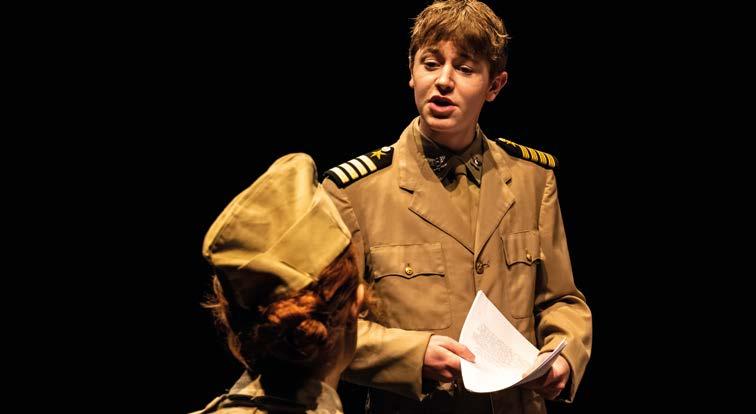
a large cast that it would be impossible to remark on each individual, so a general set of praises to everyone involved – the use of accent was particularly impressive, and the acting was equally good.
Set designer Jon Goodall created what was a rather minimalistic set and wove it into a realistic world which came alive to support and strengthen the entire performance. This was further strengthened by Costume Designer Lianne Oakley-Rowland, lighting tech Archie (6.1, J Social) and sound tech Louis (6.1, F Social), with each individual
role helping to bring the performance to life. A key reminder that a performance goes far beyond the acting, and there are many unseen roles which help to birth the ultimate production.
On departing the theatre, the audience were left with a mixture of reactions. Justice had been served, but was the outcome desirable? A key reminder of the ambivalence of the justice system around the world, and how one trial will impact an individual for the rest of their lives – what is left for the two Marines following the outcome of the trial? The gender dynamic throughout
the play was also very interesting, perhaps even non-traditional – Joanne is a voice of righteousness and refuses to back down when faced with resistance by a male-ruled military (has this changed, 30 years on?). And who could forget the brilliant monologue delivered by Arthur (6.1, C Social), reminding us of the fluctuating nature of morality and safety – what is and is not acceptable to maintain security? A most impressive performance, well done to everybody involved.

There was no shortage of birthday celebrations during the last week of the summer term, as we threw one of the biggest parties in our history to mark 175 years of Radley College. Our Festival Stage on Mansion Lawn hosted lectures, concerts, debates, live podcasts, and a magic show; ensuring there was something for every one of the 6,000 guests that joined us throughout the week.
To open the festival, we welcomed Dame Mary Berry, who hosted A Picnic in the Park by College Pond. With 2,500 people gathered and Pimm’s flowing, Mary took to the stage with some complimentary words about Radley and our beautiful grounds before judging the Great Radley 175 Bake-Off. Mellifluously hosted by the SubWarden, 20 boys and staff presented their cakes to Mary with panache and enthusiasm, she was suitably impressed.

The winning entry in the boys’ competition came from Isaac (R, H Social), who baked a vanilla sponge with Radley red velvet, decorated with chocolate shards, mini meringues, and summer fruits. Louise Vaan won the staff and families competition with a two-tier sponge, decorated with Social ties made from sugar paste, the College logos, and a gold 175. The cheers of admiration for Dame Mary and the competitors were loud and fulsome.
In Chapel Quad, on the other side of campus, a healthy audience gathered to watch Donkeys’ Years, directed by the Warden and Mr Sheldrake. The play is set in a stuffy Oxbridge college where a group of male alumni return for a 25th anniversary reunion. The usual suspects – for both a farce and a college reunion – turned up. A government minister, gossip columnist, cheerless civil servant, a gay clergyman, and the master’s wife, who found herself caught in places that she most definitely shouldn’t be. The cast masterfully navigated the complicated plot and gave three performances full of zip and humour.
Almost 1,500 braved a windy Sunday evening to hear jazz music from across the ages. Radley College Big Band and guest Old Radleians performed music by George Gershwin, Cole Porter, and Chuck Rio, before the BBC Big Band and internationally renowned vocalist, Clare Martin OBE took to the stage. Calver (6.2, B Social) and Angus (6.2, F Social) performed solos with the BBC band, a once in a lifetime opportunity to finish their musical careers at Radley in style.
We celebrated our academic excellence with two days of lectures, the first of which focused on science, technology and digital. Lecturing on the natural world, we welcomed Dr George McGavin (TV Entomologist, Oxford University), Professor Lucie Green (UCL), Professor Frank Close (Oxford University, CERN) and Sir Charles Burrell (Knepp Estate), who gave fascinating talks on entomology, the Higgs boson particle, solar physics and rewilding to our boys, guests from partner schools and members of the local community. Insights into artificial intelligence, internet policy, electric cars and robotics were provided by Professor Sir Nigel Shadbolt (Principal,

Jesus College), Professor Victoria Nash (Director, Oxford Internet Institute), Dr Melanie Britton (University of Birmingham) and Dr Nick Hawes (Director, Oxford Robotics).

In the evening, entrepreneur, reality TV star and Old Radleian, Jamie Laing (B, 2002) spoke candidly about his life

in the spotlight and shared memories from his time at Radley – which included hilarious stories of pranks played on his former Tutor, Richard Greed. The evening was masterfully compèred by Jamie’s brother, George (6.1, B Social) who gently controlled the audience questions and, more importantly, some of the racier answers!


The academic offerings of our Humanities and Arts day reflected on the past, celebrated the present day, and looked to the future. Sir Anthony Seldon gave a lecture on the history of our prime ministers by comparing them to Premier League footballers and polling boys and visiting guests on their views. Professor Nigel Biggar spoke about decolonisation: what it is and how we should contextualise it, and Professor Emma Smith gave an eloquent overview of Shakespeare’s relevance today.
Calver (6.2, B Social) chaired a fiery debate between Francis Hoar and Benjamin Butterworth on the legality and morality of Covid-19 lockdowns, and Professor Carl Gombrich and Dr Amelia Peterson, academics from the London Interdisciplinary School, outlined their vision for the future of education. Harry (6.1, G Social) interviewed Gina Miller, anti-Brexit campaigner and Founder of the True and Fair Party, drawing out insights from her legal battles with the Government and clarifying her ideological position on a range of policy issues. We also welcomed journalist Charlie Lee Potter, soldier Edward Orr and Director of Careers at Oxford University, Jonathan Black.
The evening saw the life and work of Stephen Sondheim celebrated, with an hour-long concert featuring his most famous work, including Send in the Clowns, and songs from West Side Story, Company, and Follies. Led by Mr Gladstone and compèred by Miss Buse, the concert featured a professional band accompanying solos, duets and ensemble pieces performed by boys and visiting music teachers. Wednesday’s headline act was OR Archie Manners (C, 2006), who returned to showcase some of his spellbinding magic tricks – many of which were first concocted in the corridors of C Social. His performance, laced with an acidic sense of humour, left boys, staff and guests with their jaws on the floor!

Mike Tindall, James Haskell, and Alex Payne helped us to celebrate our sporting heritage with a live edition of The Good, The Bad and The Rugby podcast. The trio, who recently completed a UK tour, told tales about on-field successes, offfield antics and even gave some personal reflections on the Queen’s Platinum Jubilee. Mike, James, and Alex made time for all our guests and then joined staff in the JCR for a drink afterwards. It was a truly memorable evening, enjoyed by a packed-out Mansion Lawn.
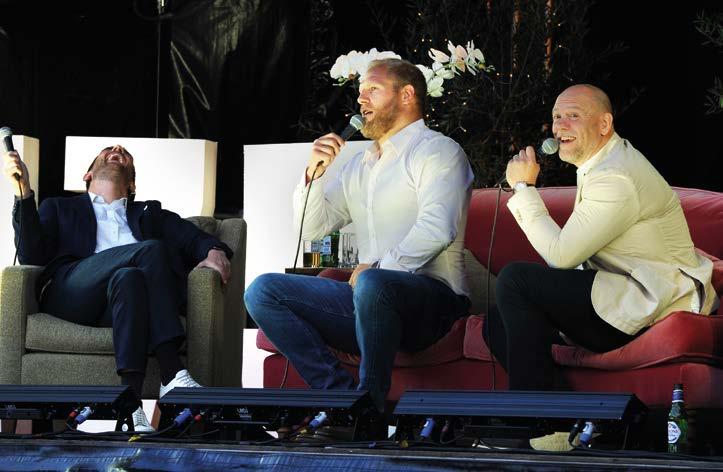
As part of our partnership work with Pegasus and Orchard Meadow, two schools in the Blackbird Leys area of Oxford, we brought 700 children to Radley to give them a memorable day out. The award-winning folk band, Kabantu, led a high-energy music workshop on Festival Stage before children took to the track for their annual sports day; ably supported by their Radleian friends.
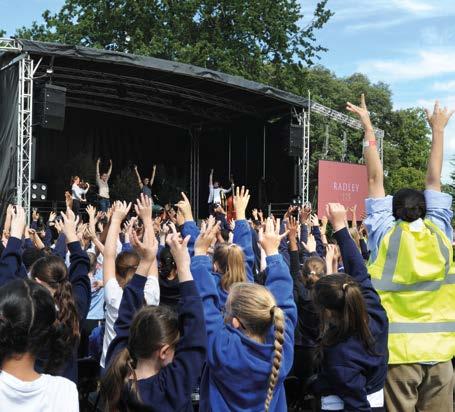
Kabantu gave a second performance to an engaged and enthusiastic audience in the Theatre on Thursday evening. Their concert, part of a UK-wide album tour, wound its way through the musical cultures of Europe, Africa, South America, and Asia; a unique musical journey. This preceded a Bands’ Night, featuring Shells to 6.2 boys performing in bands, a capella groups and even DJing.

As weary boys and staff made their way back to Socials after a busy week, everyone agreed that Festival 175 had been the perfect way to mark a major milestone.

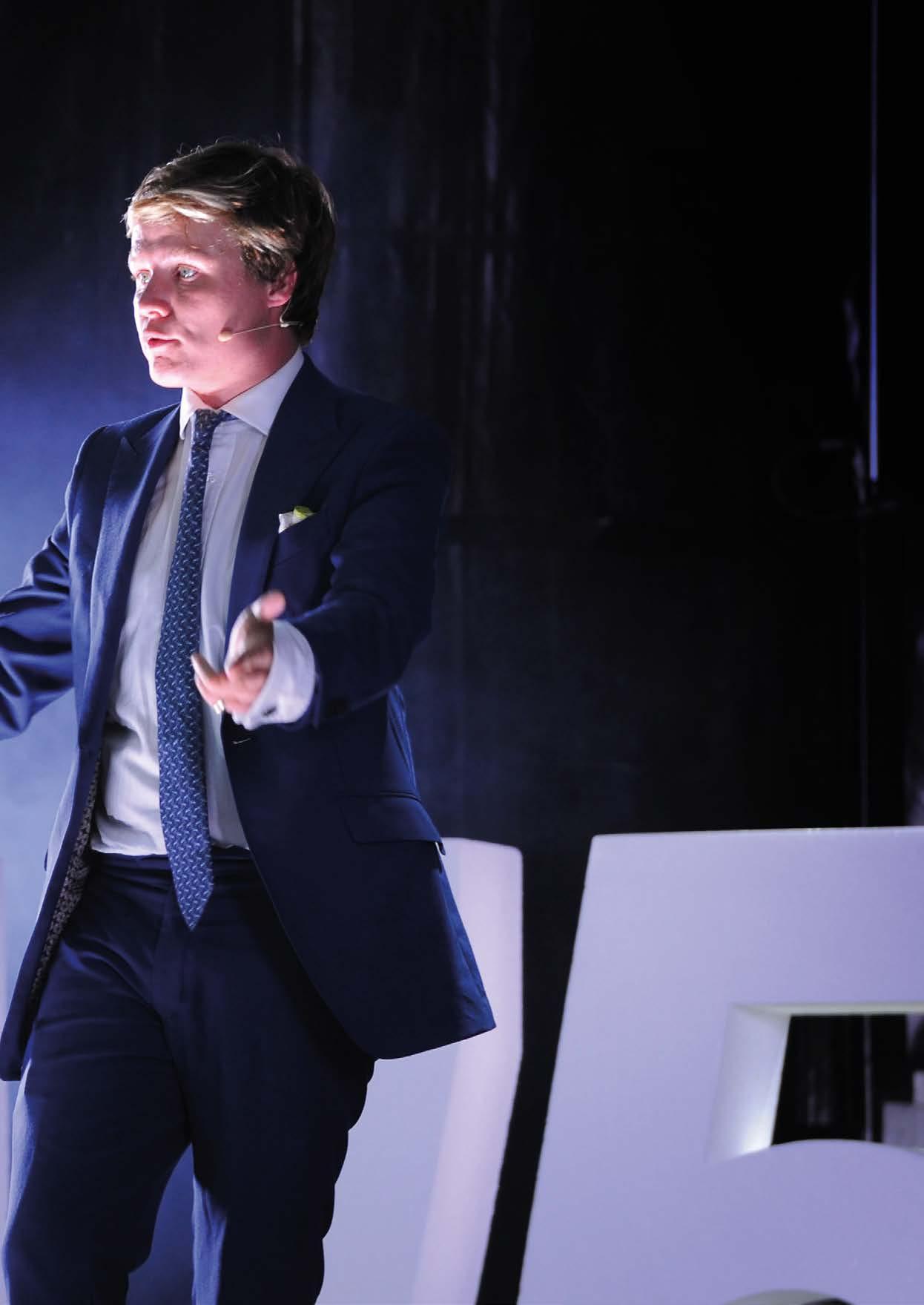
On Sunday 8th May, more than 450 guests headed for Cadogan Hall in London for a special concert to celebrate 175 years since the founding of Radley College. The event had been two years in the planning, and the 100-strong ensemble of musicians from across the school had been practicing their pieces for the last six months. Sophie Torrance, Engagement Officer for the Radleian Society, reviews the evening.

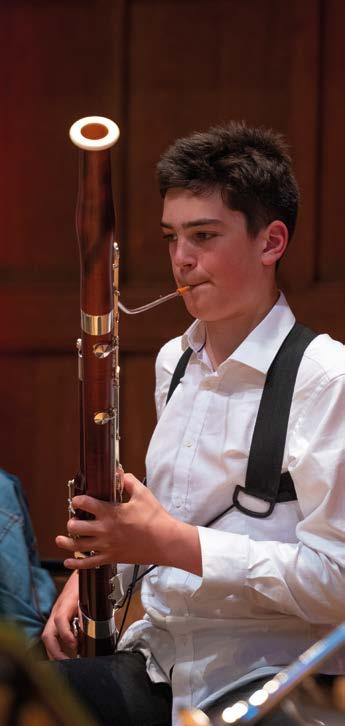

The concert opened with a rallying cry of solo piper and drums from the stage balcony, followed by a transporting performance of Tchaikovsky’s Symphony No. 5 in E Minor by Orchestra. The audience were swept away by String Orchestra’s performance of Elgar’s Serenade from Strings, and then brought crashing back to earth by the percussive rhythm of Dan Moore’s Trash Can-certo, which was warmly rewarded by rapturous applause. Orchestra
regrouped for the rich and exciting sounds of Marquez’s Conga del Fuego before the interval, where guests from across the College community gathered for a drink; the perfect tonic for the blistering Chelsea sun!
As well as Radley’s 175th, the concert also marked two significant musical anniversaries: the 90th birthday of John Williams, and the 175th anniversary of the death of Mendelssohn. Both these
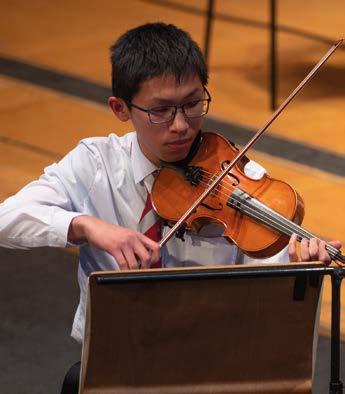
composers were celebrated after the interval with selected pieces of their work. Music was taken from John William’s score for the iconic film Catch Me If You Can and featured Calver (6.2, B Social), Tom (6.2, B Social) and Angus (6.2, F Social) who brought to life Williams’ impressionistic memoir of the progressive jazz movement with their stunning saxophone performances.
Felix Mendelssohn’s Piano Trio No. 1 in D minor was expertly played by the
Chan Piano Trio. The evening was rounded off with some big band favourites, augmented by strings and singers, creating a memorable ending.
Sam Gladstone, Precentor, commented: “I could not be prouder of the performers at this very special occasion in such an inspiring venue. It was a joyous evening, celebrating the importance of music to Radley life. The boys were outstanding: each one played a key role in making an
unforgettable evening. They should be incredibly proud of themselves. Not just for the stratospheric standard of musicianship, which reflects hundreds of hours of work and dedication, but also the camaraderie and musical communication which say a huge amount about their character and commitment. They will carry these qualities with them for the rest of their lives. It was a privilege to share the stage with them.”

Boaz (S, A Social), Johnny (S, K Social) and Tolu (S, F Social) had artwork chosen to be displayed in the Young Art Oxford exhibition at the Ashmolean Museum in May. The exhibition is an annual event open to all Oxfordshire schools and is a fantastic opportunity for aspiring artists to have their work judged by distinguished artists.
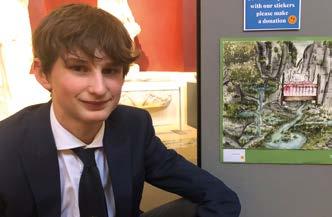
Our JC1 rugby team reached the semi-final of the National Schools Competition. Unfortunately, they lost to eventual winners Wellington College at Sixways Stadium in Worcester, but their skill and dedication throughout the competition was exceptional.
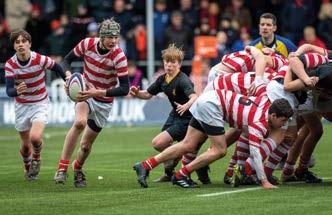
English Schools Cross Country
After an outstanding Cross-Country season, Will (S, K Social) and Henry (V, D Social) represented Oxfordshire in the English Schools Championships, their first national competition.
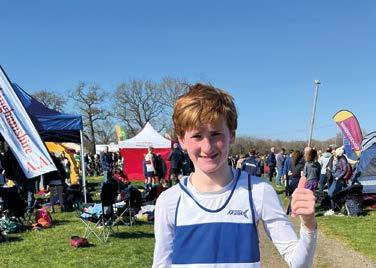
Congratulations to Aaron (S, G Social), DingDing (S, D Social), Mikolaj (R, G Social) and Max (V, S Social) who came third nationally in the Royal Society of Chemistry’s Top of the Bench competition. Each boy had to complete a theoretical paper, as well as working together on a practical task.


After England played France in the Six Nations, Will Stuart (B, 2009) was flown back from Paris by fellow OR Ed Wakefield (H, 2009), a pilot for British Airways. Although the result wasn’t in England’s favour, the two classmates enjoyed their reunion on the tarmac at Heathrow.
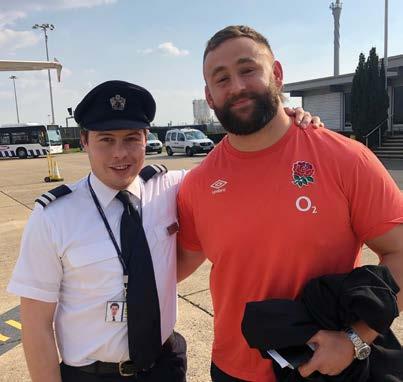
Award Winning Director
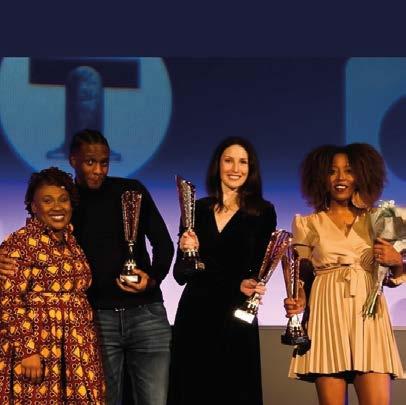
Congratulations to Victoria Buse, Director of Drama, for winning the Judges’ Award and the Audience Award at the Enter.Stage. Write. competition for playwrights.

Congratulations to Arthur (V, F Social) and Hugo (6.2, H Social), who completed their RAF Air Cadet Pilot Scheme over the Easter break. The scheme is designed for young people interested in a career as a pilot and takes place at RAF University Air Squadrons across the country.
Hector (6.2, G Social) competed in the Royal Yachting Association’s Youth National competition in April. He finished 1st in the male competition, making him the national champion. He will compete in European and World Championships later in the year.
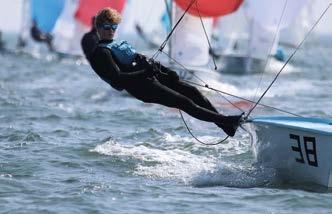
Production has started for The Last Adventure, a short film written by Arthur (6.1, E Social). The plot follows the story of a boy (Jack) who discovers he has a serious heart condition, and urgently needs a transplant. The film is being supported by Transplant Sport UK and will premiere in September.
Jovan (S, J Social) and Tom (S, L Social) were chosen to perform at the ESU Shakespeare Competition finals at The Globe in June. This was a fantastic achievement, especially for two Shells.
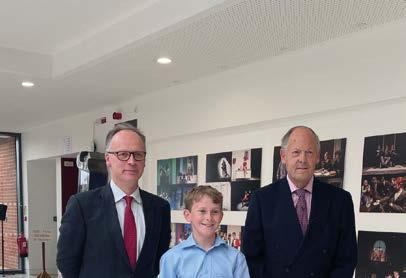



Congratulations to Matthew (6.2, A Social) who created a disability ramp for the Bowyer Arms in Radley as part of his Design Engineering course. Andy Walton, the landlord, is delighted with the result as it gives wheelchair users a far better experience at the pub.

Congratulations to Dan (6.2, D Social) who has been selected for an internship with Google as part of their Summer of Code programme. Dan was chosen for the programme out of 5,155 applicants, which highlights the magnitude of his achievement.

Congratulations to Cameron (6.2, E Social) and Hylton (6.2, K Social) who represented Great Britain at the World Rowing Championships in Valese. Cameron won gold with the U19 Men’s 4 and Hylton took silver with the U19 Men’s 8.
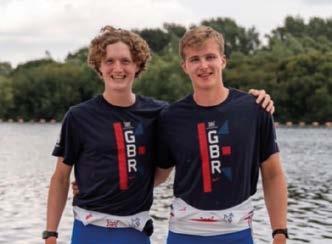
Our Shell Junior Scholars took part in a collaborative conference with Desborough College in Maidenhead. They studied Game Theory and Critical Thinking at the event titled ‘All things are not always as they appear’.
We welcomed Frank Luntz as Political Commentator in Residence in May. Frank gave lectures and led workshops with our boys, generating fascinating discussions about global politics. After his visit, Frank described Radley as ‘educational perfection’ on Twitter and proudly wore his Radley Politics Society tie for global media appearances and a speech at the Centre for Policy Studies.

We welcomed David Hart Dyke, Commander of HMS Coventry, to commemorate the 40th anniversary of the Falklands War in May. He gave an emotional talk about his role in the conflict and reflected on his distinguished career in the Royal Navy. Thanks to Ben (S, B Social) who invited David and has since launched a Military History Society.
DingDing (S, D Social) was the area winner in the Anthea Bell Translation Competition organised by Queen’s College Oxford. In addition, Joe (V, E Social) and Mikolaj (R, G Social) will have their poems published in an anthology art part of the Prismatic Jane Eyre project. They composed work in Mandarin and Polish based on a stimulus from the novel.
Congratulations to Ed, Hamish, Max and March, who rowed and cycled from London to Paris in aid of the Ruth Strauss Foundation and Batten Disease UK raising £15,000.
